Last updated on November 7th, 2024
Featured image: Teara Fraser and Kiana from Iskwew Air, leading the charge of Indigenous Aviation | Photo by Josh Neufeld
Indigenous women entrepreneurs in aviation
by Claudia Laroye
Teara Fraser fell in love with flying while soaring over the African savannah on a trip to Botswana in 2009. Securing her pilot’s license a year later, Fraser, a Métis of Cree ancestry, went on to found Vancouver-based Iskwew Air, Canada’s first Indigenous, woman-owned airline, in 2019, just before the pandemic hit.
Fraser and her small team at Iskwew (pronounced ISS-KWAY-YO, which means woman in the Cree language) navigated that difficult time and emerged resilient on the other side of the near-complete worldwide aviation shutdown. Today, she is an entrepreneur, advocate for zero-emission flights, and champion for Indigenous youth and women, one of a handful of talented Indigenous women pioneers working in the aviation industry in Canada.
Join us: Get articles about inspiring women in travel directly to your inbox. Sign up here!
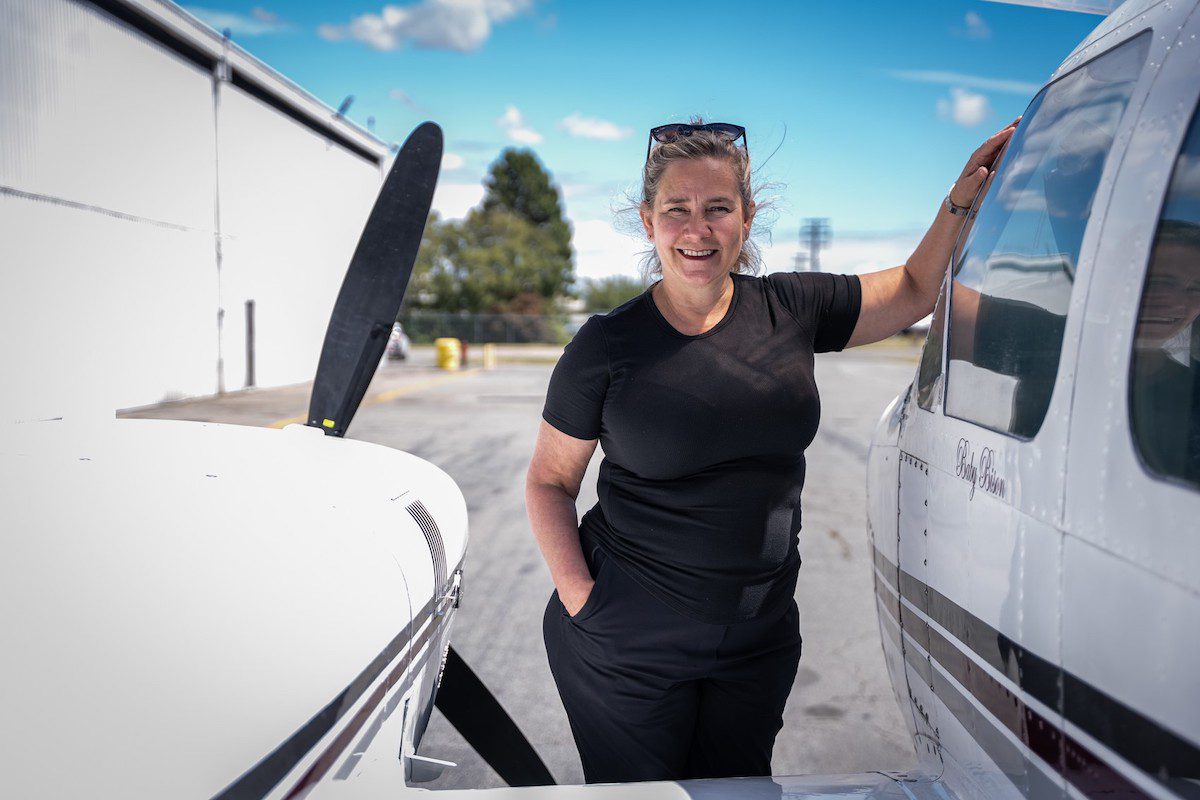
Teara Fraser, Founder of Iskwew Air / Photo by Josh Neufeld
Indigenous women aviators take flight
Aviation has historically been a male-dominated industry. According to the United Nations International Civil Aviation Organization’s (ICAO) 2021 global survey on the status of licensed aviation personnel by gender, the number of women holding positions as pilots, air traffic controllers, and maintenance technicians is 4.9 percent.
In Canada, fewer than half of one per cent (.5 per cent), are Black, Indigenous or women of colour. But Indigenous women are marking their presence felt on airfields and cockpits across the country.
Based in British Columbia, Gulf Island Seaplanes supplies Indigeneous-owned seaplane service to and from YVR Airport, Gabriola Island, Maple Bay, as well as seasonal service to Hornby Island Vancouver Harbour.
The family-owned aviation company (co-owner Alison Evans is from Hagwilget Village First Nation in Northern British Colombia), proudly displays its Indigenous identity on its seaplanes, which are wrapped with artwork by Tom Spetter at Animikii. The designs feature a thunderbird, a lightning snake and a face representing its passengers. The mountain peak in the company’s logo represents Stegyawden (Hagwilget Peak), a nod to Evans birthplace.
With her husband and company chief pilot Sean Evans, Gulf Island Seaplanes is incorporating the oral histories of elders into onboard narration of stories and landscapes. Evans recounted to Qantas Airline’s Travel Insider magazine that her goal is to “link those sites and landmarks to stories of resilience and strength in the First Nations people of this area,” citing the unique opportunity to show people the community that was here before Vancouver existed.
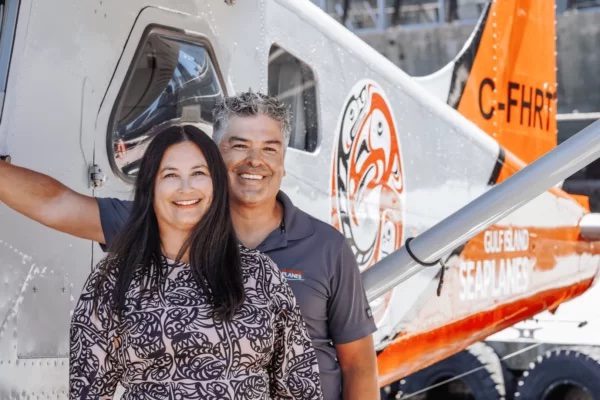
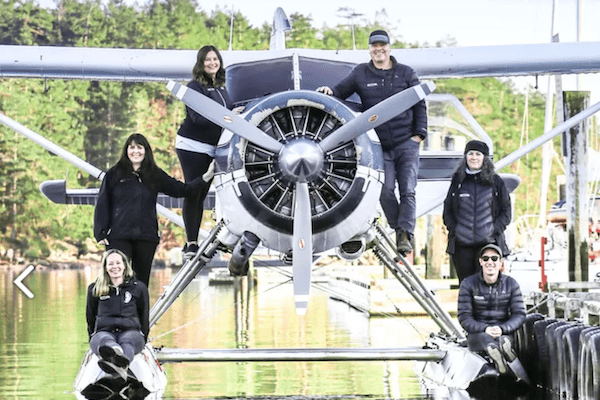
The Gulf Island Seaplanes team / Photo by Gulf Island Seaplanes
Above the Arctic Circle and beyond, Canadian North has been servicing Inuit communities as an Indigenous-owned company since 1990. Its President and CEO is Shelly De Caria, an Inuk woman born and raised in Kuujjuaq, Québec, who speaks Inuktitut as her second language.
De Caria’s leadership position marked a historic milestone as the first Inuk woman to helm Canadian North, a reflection of the airline’s mission to represent and serve its remote and northern communities in Canada’s Arctic. In January 2021, Inuvialuk Captain Dawn Macfarlane became the first Inuk woman to captain a Canadian North 737 jet.
Read More: Indigenous Tourism Resources for Travellers
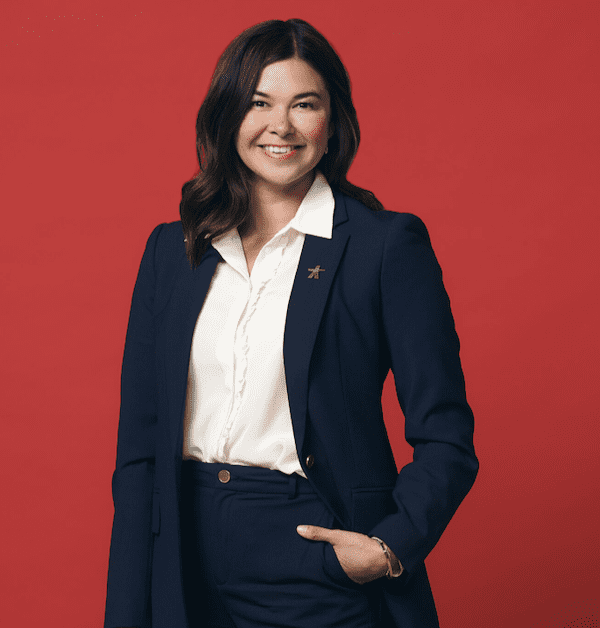
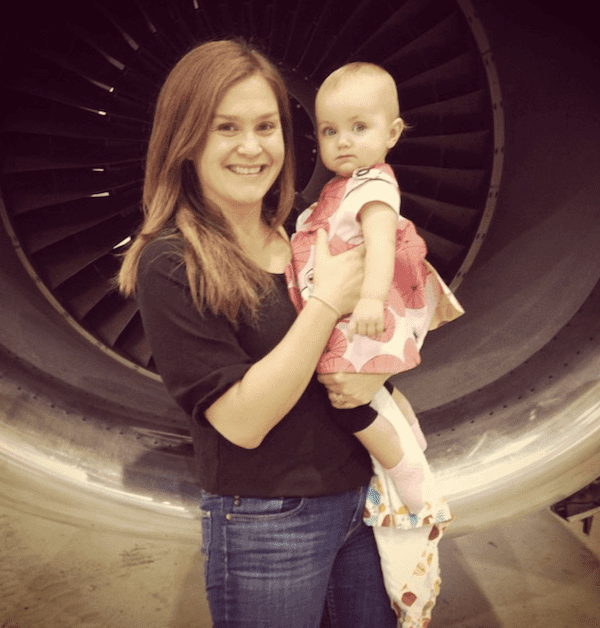
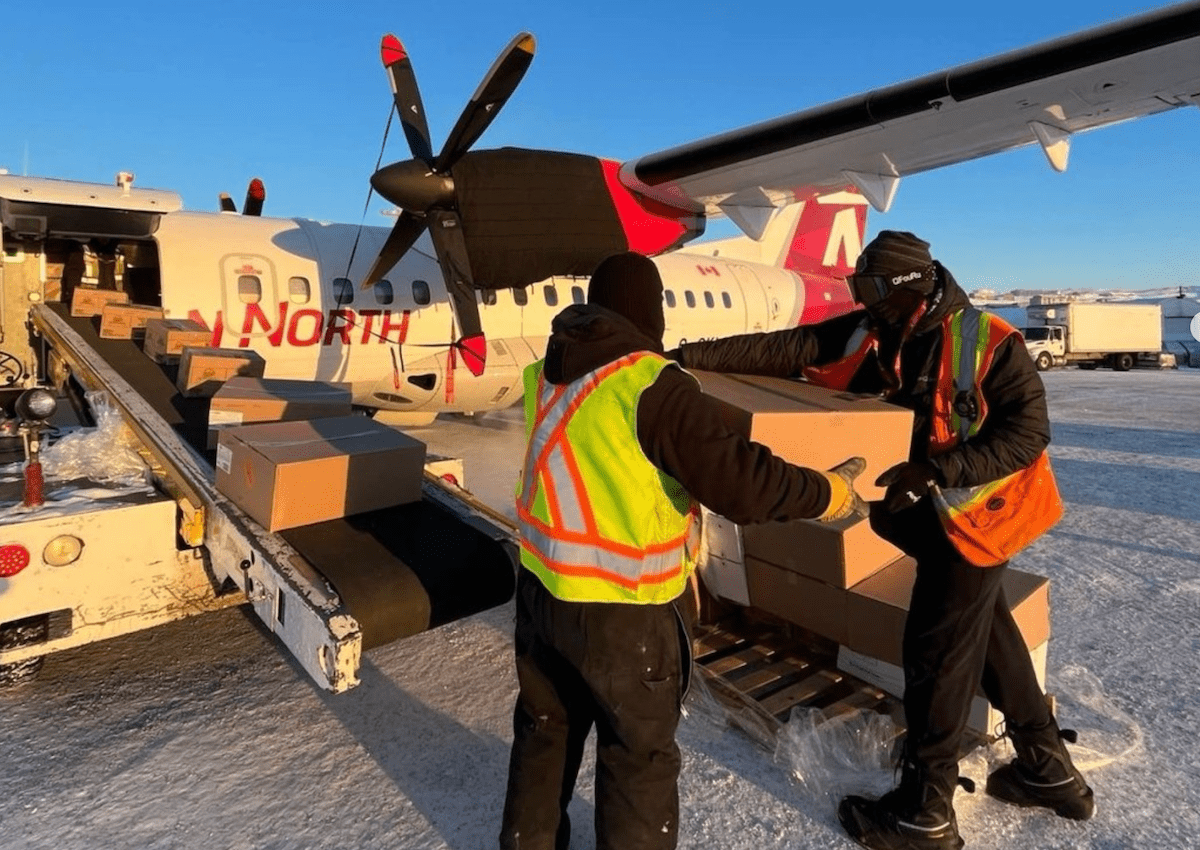
A similar path has been charted by northern Quebec-based Air Creebec. The airline appointed Tanya Pash as the first woman CEO of the 100% Cree-owned airline in July 2023.
Pash told the CBC that her appointment demonstrates how far the Cree Nation has come. “You see more and more women in leadership and to be the first female president of Air Creebec … it’s an honour in itself.”
Air Creebec operates a fleet of 18 aircraft, including Dash 8-300, Dash 8-100 and HS748 cargo aircraft. From its base in Montreal, the small airline services remote First Nations communities in northern Ontario and Quebec, including many around James Bay.
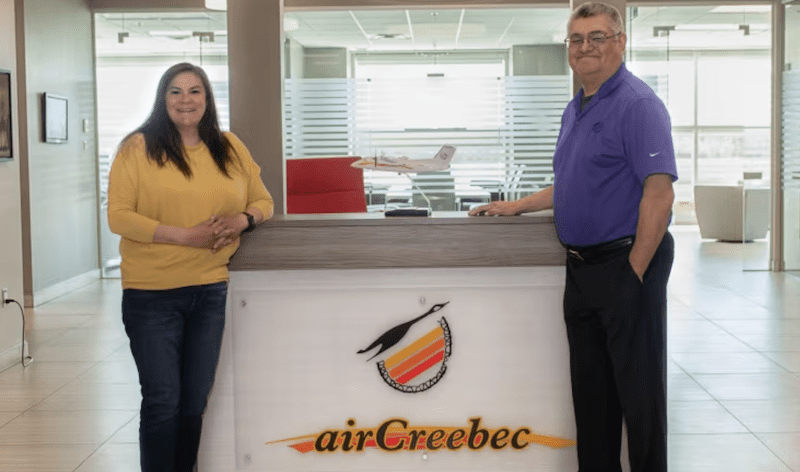
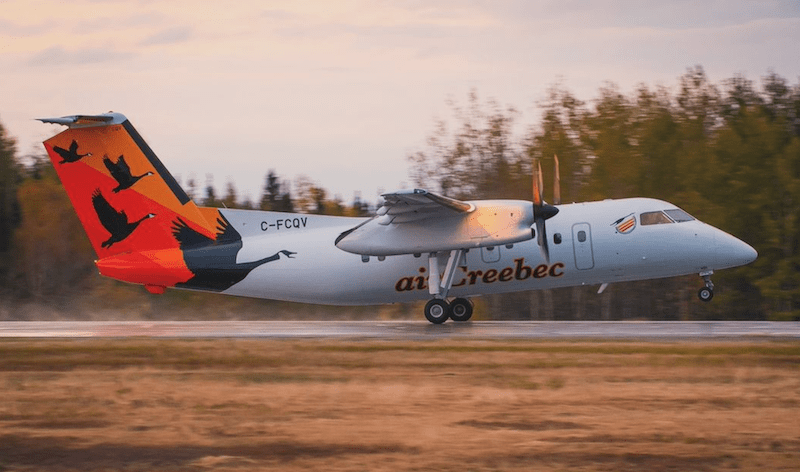
Investing in the future of Indigenous aviation
Post-pandemic, Indigenous airlines in Canada are impacted by the same challenges affecting most Canadian aviation companies – there’s a shortage of qualified pilots.
To address this challenge, Canadian North teamed up with Mount Royal University in 2023 to offer flight training support to Inuit pilots. De Caria told the Globe and Mail that the company wanted “to encourage Inuit to go to school … [then] go back home and operate for our airline for their community.”
Iskwew Air’s Fraser has also launched a pilot training program in Metro Vancouver under her aerospace tech company, Elibird Aero. In Manitoba, the Atik Mason Indigenous Pilot Pathway program was founded by the Keewatinowi Okimakanak advocacy group in 2023, with the aim of removing the financial obstacles preventing Indigenous people from pursuing a career in aviation.
In Ontario, FNTI (First Nations Technical Institute) is an Indigenous-owned and governed post-secondary school located in Tyendinaga Mohawk Territory. The FNTI’s First Peoples’ Aviation Technology program has been around since 1990 and is purported to be the only post-secondary Indigenous aviation program of its kind in Canada. In 2021, the flight school celebrated its first all-female crew.
According to Canada’s Indigenous female aviation pioneers, sponsoring and developing aviation programming targeted to Indigenous youth is an important and necessary step in showing the next generation of Indigenous pilots that a career in aviation is possible.
“When I was six, seven, nine years old, there were no Inuit in these positions,” De Caria says. “It was just a dream.”
More to Discover From Canada
Where to Stay in Toronto, Canada: Recommendations From Solo Women
Women share their top choices on where to stay in Toronto, Canada, including hotels, hostels, and affordable options across the city.
The Black Fly in Our Chardonnay: Booze Around the World
Jules Torti and her wife Kim have been on countless adventures in search of booze around the world, from moonshine to craft beers and more!
Why Women Should Travel to Montreal, Quebec (From a Local)
Sandra Phillips says her home of Montreal, Quebec has much offer women over 50, largely because of its diversity.

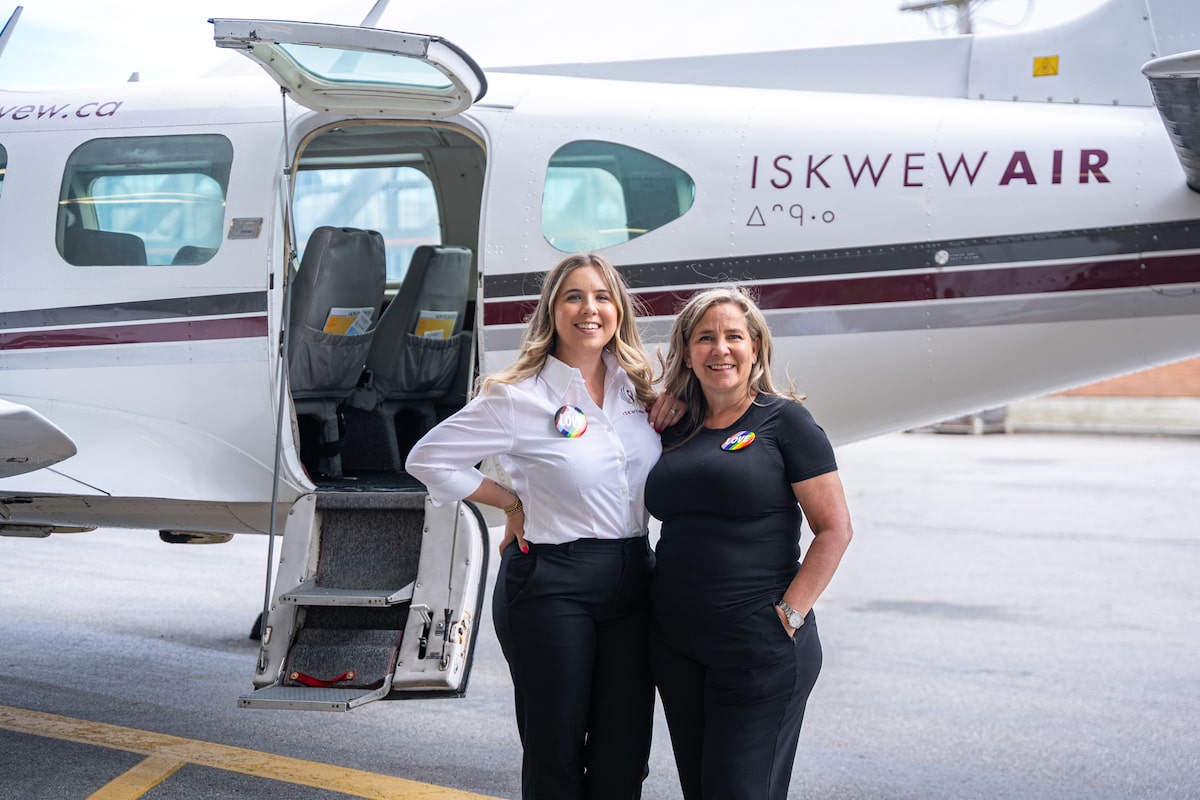


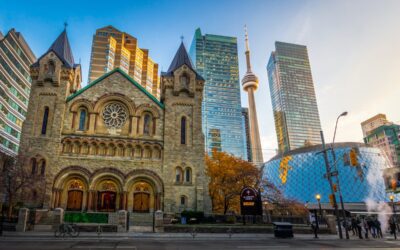
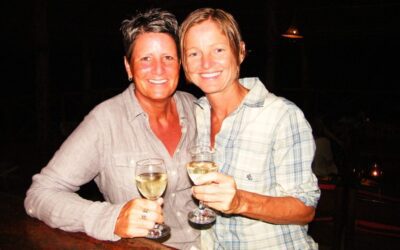
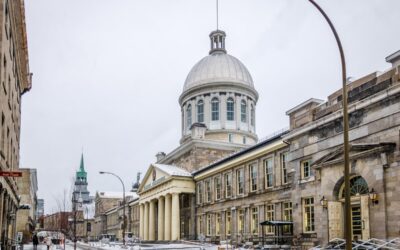
0 Comments
We always strive to use real photos from our own adventures, provided by the guest writer or from our personal travels. However, in some cases, due to photo quality, we must use stock photography. If you have any questions about the photography please let us know.
Disclaimer: We are so happy that you are checking out this page right now! We only recommend things that are suggested by our community, or through our own experience, that we believe will be helpful and practical for you. Some of our pages contain links, which means we’re part of an affiliate program for the product being mentioned. Should you decide to purchase a product using a link from on our site, JourneyWoman may earn a small commission from the retailer, which helps us maintain our beautiful website. JourneyWoman is an Amazon Associate and earns from qualifying purchases. Thank you!
We want to hear what you think about this article, and we welcome any updates or changes to improve it. You can comment below, or send an email to us at [email protected].